- Home
- Megan Shepherd
The Madman's Daughter (Madman's Daughter - Trilogy) Page 7
The Madman's Daughter (Madman's Daughter - Trilogy) Read online
Page 7
It struck me he was almost a ghost, straddling the fine line between the living and the dead. I wanted him to live, to see again whatever was so important in that photograph, as if it would make up for my morbid fascination.
The rain came harder now. A sailor pushed past me with a flask. Montgomery held it to the castaway’s lips, but he didn’t wake, so Montgomery poured the water over his face instead. A slight moan. A cough. And then the castaway jerked awake, blinking, rain streaking down his face. His wild eyes darted back and forth.
“We found you at sea,” Montgomery said. “Can you speak? What’s your name?”
But the castaway shook his head, muttering something I couldn’t make out, clutching the photograph so hard it crumpled. He grew more agitated with each breath, kicking and tearing at some invisible demon. The gash on his face reopened, and a line of dark blood rolled down his neck.
“Calm yourself!” Montgomery threw his weight on him. The castaway was no match for his size, but delirium made him fierce, and Montgomery had to struggle to hold him down.
“Sea madness,” Montgomery said. “Balthazar, get the chloroform.”
The castaway clawed at the deck, nearly grabbing my foot. Montgomery jerked his chin at me. “Get back, Juliet!” he yelled.
But all I could do was shuffle back a few inches, wondering what was happening in the young man’s mind. He seemed to think he was in some other place. But then his eyes found mine and he stopped struggling, like the mad fog had lifted. Like he remembered something—no, recognized something. An odd sensation tickled the back of my neck. Did he recognize me? I’d never seen him before in my life. His desperation was familiar—I had only to look in a mirror to recognize that—but he was still a stranger. His lips formed a few voiceless words that drew me closer, fascinated, wanting to hear, wanting to know who he was.
“Juliet, I said stay back! He might be dangerous.”
Montgomery’s voice broke the spell and I tore my eyes away. All the sailors were staring at me. I shrugged hesitantly, as curious as they were.
Balthazar stumbled up beside me, clutching a glass bottle and cloth soaked with chloroform. The castaway took one look at Balthazar’s hulking form and started straining again. He twisted out of Montgomery’s grip and slammed a fist so hard against the deck that the weathered boards splintered. My lips fell open. That sort of strength came only with powerful delusions. He didn’t know what was happening, I realized. A part of him had slipped away out there in the open sea. He let out one hoarse yell before Montgomery thrust the cloth over his mouth and nose and he slumped to the deck.
The captain sank to a knee to rifle through the castaway’s pockets. Montgomery frowned as he handed the cloth back to Balthazar and glanced at me, a question in his eyes: What was it about me that had made the castaway go silent?
But I was as much at a loss.
“Might as well pitch him back overboard,” the captain said, turning out only empty pockets. “You saw him. Mad. Can’t have a madman hanging about.”
“If you throw him overboard, that’s murder,” Montgomery said tensely. “And I doubt you’d be saying that if you’d found money in his pockets.”
“Ain’t murder if he can’t pay.”
“You’re not throwing him overboard.” Montgomery’s voice was hard.
The captain sat up, eyeing him with something like a challenge. “You going to take him with you, then, boy?”
Montgomery hesitated, giving Balthazar an uneasy glance before turning back to the captain. “Look at his buttons—silver. He comes from wealth. Give him a few days to regain consciousness, and I’m sure he’ll offer to repay you generously.”
Balthazar wrapped an arm around my shoulders and started to lead me away. My feet went with him as if of their own accord, but I couldn’t tear my gaze from the castaway. The gash across his face, the bruises on his bare arms from being tossed about at sea. He seemed so eager to cling to a slip of life. He was a survivor, like me.
NINE
MONTGOMERY ATTENDED TO THE castaway day and night. A rumor circulated that the young man didn’t remember his own name, or how he’d been shipwrecked, or if he was the only survivor. The captain lost patience and threatened to throw him overboard again, but Montgomery slipped the captain the last of our coins in exchange for setting up a cot for him in the galley. It was one of several places on the ship I wasn’t allowed, but after a few days without seeing Montgomery or hearing more than snatches of gossip about the castaway, I couldn’t stay away.
The galley was as dark and damp as the inside of a rotting cellar. The only light came from the cooking fire and a few lit candles. The sailors had laid the young man next to the chimney, where the bricks would keep him warm, but in sleep he looked as cold as Death.
Montgomery glanced up when I entered. We both knew I wasn’t supposed to be there. Rather than scold me, he handed me a dirty cloth and nodded toward a copper pot on the hearth. “Boil this. Add a few drops of chlorine to the water. The vial’s next to the fire.”
Our hands grazed as I took the cloth. My skin still tingled with the memory of our fingers intertwined.
“I hear you’re quite the doctor,” I said, adding a few drops of chlorine to the pot. Steam billowed in the dank space around me.
Montgomery carefully peeled back a bandage on the young man’s leg, airing the wound. It oozed with angry white pus. “Hardly. Your father says I’m useless.” He reached for a bottle of Elk Hill brandy and splashed some onto the scraped flesh. The castaway moaned but didn’t wake.
The boiling water tumbled over itself in great bubbles, and I submerged the soiled cloth in the pot with a wooden spoon. “My father used to call everyone useless, from the scullery maid to the dean of King’s College. You’re far from useless.” I stirred the pot slowly, throwing glances at the castaway’s face in the candlelight. “How is he?”
“He’ll live.” Montgomery picked up a needle and a length of black thread. “If we’d found him a day later, maybe hours, he might not have been so lucky. I’d hoped this would have healed, but it got infected. Not a damn clean thing around here.” He pinched the skin around the scrape and punctured it with the needle.
I memorized his gestures as he stitched the wound closed. His movements were like a long-acquired habit, something he did so often, his hands could practically think on their own. When he was younger, he used to build fires in my room’s small fireplace with the same certainty of action. For Montgomery, work came as naturally as an afterthought—it was keeping up his strong front that required concentration.
“Has he been awake?” I asked.
“Off and on.”
“Did he tell you what happened to him?”
Montgomery started on the next stitch, tugging the skin tight. He paused to toss me the old bandage, which I added to the pot. The billowing water turned a murky shade of brown. “He remembers a little more each day. Yesterday he told me he was a passenger on the Viola, bound for Australia, but it took on water from a cracked hull some twenty days ago.”
“Twenty days! Was he the only survivor?”
“He gets confused when I ask questions. But in his sleep, he says as much.” His eyes flashed. “He’s asked about you.”
I nearly knocked over the boiling pot. “Me? What did he ask?”
“Who you were. Where you were going. What a pretty girl was doing on this kind of ship. It seems you made quite an impression.” There was a flicker of jealousy in Montgomery’s voice that made me focus on the pot, studying the rising steam.
“What did you tell him?”
“The truth,” he said. “You’ve come to find your estranged father.”
“So you don’t think he’s dangerous?”
Montgomery tied off the last stitch and bit through the thread. “No, he isn’t dangerous.” He stood, wiping his hands on a rag, and came to the hearth. Steam made sweat bead on his forehead. I was suddenly aware of the intense heat in the small galley, and that we were, wit
h the exception of the sleeping castaway, alone. “He’s the gentleman type. You saw the silver buttons. Probably never had a true day of hard work in his whole life.”
“Still, he survived a shipwreck.”
Montgomery brushed his hair back, studying me with those deep blue eyes. “What has you so interested in him?”
The tone in Montgomery’s voice made me stir the water faster, aware of the red creeping up my neck. Lucy would have said something coy. She believed the way to keep a man interested was to make him jealous, but Montgomery wasn’t mine to begin with, and he had no good reason to be jealous of a half-dead castaway, silver buttons or not.
“He had a photograph,” I said into the pot. “Did you find it?”
Montgomery reached to the shelf behind me, between the larder and block of salt. A trace smell of spiced brandy clung to his hands. He pulled down a scrap of crumpled paper and handed it to me. The photograph, waterlogged and torn beyond recognition.
I could only make out an overcast brown sky, the vague shape of people. I glanced at the castaway. What had it meant to him?
“The helmsman spotted debris in the water this morning,” Montgomery said. “We’re getting close to the island. It’s just a matter of days now.” His voice held the relief of reaching home after a long voyage. But there was an undercurrent of worry. “I don’t like the thought of leaving him here, especially without a doctor aboard. That wound will get reinfected without treatment. And if he can’t convince the captain he can pay, once we leave there’s no telling what will happen. They don’t owe him anything.”
The castaway muttered something in his sleep and tossed around in the cot. I brushed my hair back, stealing a glance at the black stitches in his leg. “You want to take him with us,” I said, reading Montgomery’s thoughts.
His jaw tensed indecisively, but he shook his head. “It crossed my mind, but no. Your father doesn’t allow strangers on the island. There’s nothing to be done for him.”
“He’s been in a shipwreck. Father will take pity on him.”
Montgomery shook his head harder. “It was a foolish idea. Forget I said anything.” He took the pot off the grate and set it on the cook’s table. “Watch him for a moment, if you would. I have to check on the animals.”
“What if he wakes?”
A corner of his mouth turned up. “Say hello.”
And he left me with the castaway, the wooden spoon, and my thoughts drifting in and out of the swirling steam.
A FEW DAYS LATER I stood on the sun-bleached deck, squinting into the rigging, chewing on a fingernail. I was studying the monkey. It studied me back. Bribing the captain to spare the monkey’s life had been easy—apparently he valued a few bottles of Father’s brandy over being right. But getting the creature down was now my problem. And with our arrival imminent, I was running low on time.
“Monkey, look!” I held up my father’s silver pocket watch. One of the crew had told me monkeys liked reflective objects, but I dangled the watch for the better part of an hour with no results.
Balthazar and Montgomery chuckled behind me.
“Be quiet!” I chided. “You frighten it, Balthazar. And you too, Montgomery. It remembers you wanted to shoot it.”
“Have you tried a banana?” Montgomery offered.
I scowled. “I haven’t got a banana. And unless you do, clear out!”
Laughing, he went back to tending the caged animals. I folded my arms, puzzled and frustrated. I’d been methodical in my attempts to get the monkey down. First I tried setting a trap, then luring it into a cage with food, and then climbing into the rigging until the boatswain and the whole first watch tried to look up my skirt. Nothing had worked.
I slid the watch into my pocket and watched the monkey swing effortlessly from bowsprit to boom, graceful as a bird. Its skill was astounding. It never missed, never hesitated, never doubted. I was overcome with an urge to try myself, though I knew it was impossible. I’d learned enough from Montgomery’s lessons and Father’s books to know we weren’t built for climbing and swinging, though humans and monkeys had the same basic limb structure. The only major differences were the double-curved spine on a human and the flexible ligaments in a primate’s feet. Both easily alterable through surgery. My mind wandered, curious whether science would ever find a way to make us as graceful as animals.
“Don’t you wish you could do that?” I called to Montgomery over my shoulder. “It’s like it’s flying.”
There was no answer. I turned, but Montgomery had gone below. In his place was the castaway, awake, upright, watching me from across the deck. Surprise drenched me like a splash of cold water.
The sun blisters on his face had faded, though the gash on the side of his face was a constant reminder of the shipwreck. He’d cut the tangles out of his dark hair, and it now fell just below his chin, unfashionable but at least clean. Only a whisper remained of that haunting apparition, and now he was merely flesh and blood and bone and bruises. He looked naturally lean, so his gauntness was even more pronounced, yet there was something undeniably strong about him.
He waved.
I hesitated, and waved back.
TEN
THE NEXT AFTERNOON I found a lidded bowl full of live worms and roaches outside my door with a note written in a gentleman’s handwriting. It wasn’t in Montgomery’s hand, and none of the sailors could write, so it took little reasoning to determine who it was from.
Monkeys adore insects, it said.
I went above deck, set the teeming bowl under the rigging, and removed the lid. One roach saw its chance to escape and crawled up the side, but I flicked it back in. I hid behind some crates, settling in to wait, but heard the sound of the ceramic bowl moving within only a minute. The monkey was so engrossed in the bowl that he didn’t even notice when I sneaked up behind him and slipped a collar around his neck. I let him finish eating before putting him in his new cage.
Monkey secured, I found the castaway sitting in the corner of the forecastle deck outside the boatswain’s hold, his back to me, leaning over an old backgammon board balanced on top of a barrel. He was studying the game’s red and black tokens by the fading sunlight. They were set all wrong. He didn’t seem aware of the sailors throwing him angry glances for taking up space on the deck.
I studied him as carefully as he studied the game. Despite the gash along his face, there was something undeniably attractive about him. Not handsome in a classic way like Montgomery, but more subtle, deeper, as if his true handsomeness lay in the story behind those bruises and that crumpled photograph. Something to be discovered, slowly, if one was clever enough to decipher it.
“They say you’re mad,” I said.
His arm jerked as he turned toward my voice. The backgammon game spilled to the floor, red and black tokens rolling across the deck. I fell to my knees to collect them, and he bent to help. He seemed reluctant to meet my eyes. Reserved. His fingers absently drifted to the gash under his eye. A muscle twitched in the side of his jaw. He was scarred from the shipwreck, of course, but there was something in his guarded movements that spoke of more, as though the scars might continue deep below the surface.
“I couldn’t remember much at first,” he said, daring a glance at me. This close, I saw that his brown eyes had flecks of gold that caught the fading sun. “But it’s coming back to me.” His hand dropped away from his face. A sailor passed, kicking one of the tokens down the deck and grumbling curses about cadging stowaways.
The castaway added, “I’m not mad.” For a moment his eyes shifted oddly to the left, as though half his mind was still trapped in that dinghy or had sunk with the ship. He had suffered so greatly, and the sailors seemed keen to make him suffer more.
“Mad enough to come above deck and get in the sailors’ way. You aren’t making yourself popular with them,” I said, and then lower, “You should be careful.” I handed him the tokens I’d collected and nodded at the board. “Would you like to play a round?”
&n
bsp; The corner of his mouth twitched again, this time in a half smile. He straightened the backgammon board and stacked the tokens one by one.
I folded my legs and sat across from him. I tried not to stare at the bruises on his arms and face. His knuckles were scraped raw nearly to the bone, and I remembered that hand clutching the photograph, clutching to life. Hard to believe this was the same person.
“Do you remember what happened?” I asked. “The shipwreck?”
His eyes slid to me, only a flash, judging whether or not to trust me. He picked up the dice. “Yes.”
“And your name?” I asked.
“Edward Prince.” He said it slowly, as though he had little information about himself to share and had to ration it carefully.
“I’m Juliet Moreau.”
He nodded slowly. “Yes, I know.” And I remembered he’d asked Montgomery about me.
It was my turn to stare, wondering what he’d thought of me that first day, when he’d been lost in a whirlpool of delusion. He’d said something that none of us had heard. Now he stared at the tokens, just slices from an old mop or broom handle, with the dice waiting in his hand. The tokens were still set wrong, and I instinctively reached out to rearrange them before starting our game. It felt good to put something in order.
“How did you survive?” I asked.
My question caught him off guard, and his hand curled around the dice. He gave a cautious shrug. “The grace of God, I suppose.”
I watched his broken fist working the dice, the twitch of his bruised jaw, the strength in his wiry shoulders. His words came too easily. He’d said what he thought I wanted to hear, not what he was truly thinking.
“I don’t believe you,” I said. He tilted his head, surprised. “Twenty days at sea. No food. No water. No shade. The sole survivor of dozens of passengers. God didn’t save you. You saved yourself. I’d like to know how.”

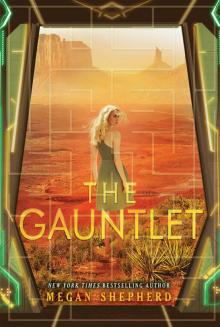 The Gauntlet
The Gauntlet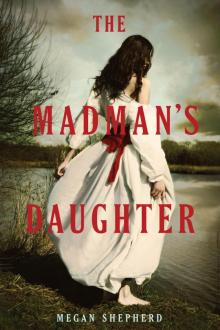 The Madmans Daughter
The Madmans Daughter The Cage
The Cage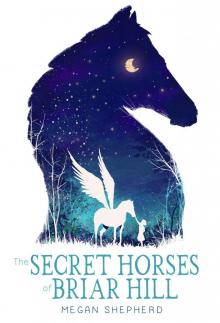 The Secret Horses of Briar Hill
The Secret Horses of Briar Hill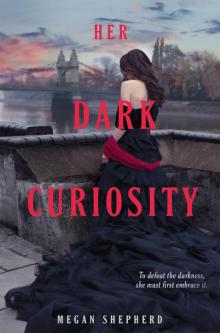 Her Dark Curiosity
Her Dark Curiosity The Hunt
The Hunt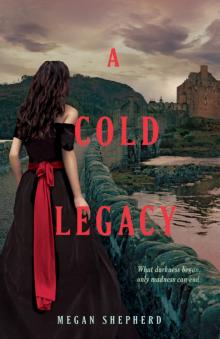 A Cold Legacy
A Cold Legacy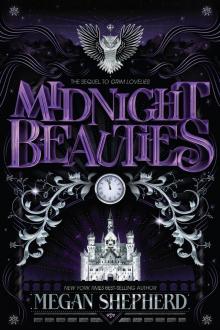 Midnight Beauties
Midnight Beauties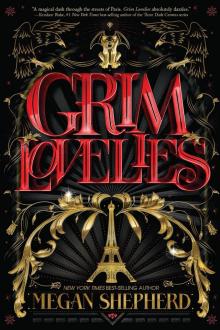 Grim Lovelies
Grim Lovelies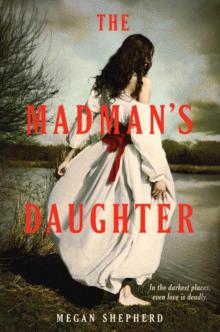 The Madman's Daughter (Madman's Daughter - Trilogy)
The Madman's Daughter (Madman's Daughter - Trilogy)